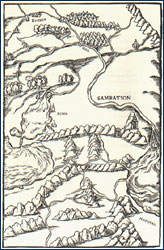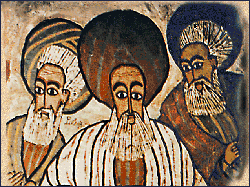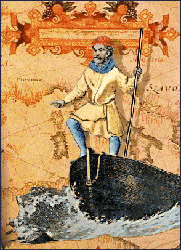 |

|
Where are the Ten Lost Tribes? Ever since the Assyrians exiled the Lost Tribes of Israel in the eighth century B.C., the mystery of what happened to the ten tribes has deepened inexorably with time. Where did they go? Are the claims by contemporary groups who say they are descended from the Lost Tribes legitimate? Here, we present an abbreviated history of the Lost Tribes and modern-day claims of descent. Excerpted with permission from Beyond the Sambatyon: The Myth of the Ten Lost Tribes, a CD-ROM released by MAXIMA New Media in 1995. (For more information on the CD and an accompanying book, see Resources.) Beyond the Sambatyon | Historical Introduction | Benjamin of Tudela New World Part I | New World Part II | The False Messiah | Tribal Groups Japan | Beta Israel-Ethiopia | Chiang-Min China
Over 2,700 years ago, the Assyrians exiled the ten tribes of the Kingdom of Israel. The ten tribes would have returned at once to the Holy Land had not the Lord encircled them with the legendary river, the Sambatyon. All week long, every week, the great and terrible river Sambatyon seethes with wild rapids, churning great rocks in billows up to the heavens. On the Sabbath, however, the river rests from its fury. But the ten tribes cannot cross because of their great piety and their reverence for the day of rest. And so, to this day, the search for the ten lost tribes continues... beyond the Sambatyon. Historical Introduction "In the ninth year of Hoshea, the king of Assyria captured Samaria and he carried them away to Assyria and placed them in Halah, and on the Habor, the river of Gozan, and in the cities of Medes." In the years 722-721 BC, the Ten Tribes who comprised the northern Kingdom of Israel disappeared. Conquered by the Assyrian King Shalmaneser V, they were exiled to upper Mesopotamia and Medes, today modern Syria and Iraq. The Ten Tribes of Israel have never been seen since. Or have they?
During a later period, a monarchy was established, but with the death of King Solomon, the state was divided in two. The tribes split along territorial and political lines, with Judah and Benjamin in the south loyal to the Davidic house, and the rest of the tribes in the north ruled by a succession of monarchies. The southern tribes of Judah and Benjamin constitute the historical forbears of most of the Jewish People as it is known today. And the Ten Tribes of the Northern Kingdom? It appeared that they had been eliminated for eternity. But the prophet Ezekiel envisioned a different tomorrow: "Behold I will take the children of Israel... and will gather them on every side, and bring them into their land. And they shall be divided into two kingdoms no more." Across centuries and continents, the prophetic words instilled hope that one day, brethren would join brethren, and together rebuild the kingdom of God. But first... the Ten Lost Tribes had to be found.
Benjamin, son of Jonah, was determined to see the world. In 1165, in an age when travel meant peril on road and sea, he set out from his native Tudela, Spain on an extended voyage. He spent several years visiting Jewish communities in the East and West. The great medieval Jewish traveler is familiarly known as Benjamin of Tudela. We know little about him other that what emerges in his famous Book of Travels. In whichever community he visited, and even in those he didn't, Benjamin recorded his observations, many of which are quite imaginative. When visiting in Persia and in the Arabian peninsula, Benjamin came across Jewish tribesmen whom he was convinced were descendants of the Lost Israelites. The self-sufficiency and fierceness of these tribesmen deeply impressed him. He writes as follows: "There are men of Israel in the land of Persia who say that in the mountains dwell four of the tribes of Israel, namely, the tribe of Dan, the tribe of Zevulun, the tribe of Asher, and the tribe of Naphtali. "They are governed by their own prince, Joseph the Levite. Among them are learned scholars. They sow and reap and go forth to war as far as the land of Cush, by way of the desert. They are in league with the Kofar-al-Turak, pagan tribesmen who worship the wind and live in the wilderness."During his visit to Arabia he came across the largest Jewish settlement in the region, the Jews of Kheibar. "These tribesmen," he writes, "are of the tribes Reuven and Gad, and the half-tribe of Menasseh. Their seat of government is a great city surrounded by the mountains of the North. The Jews of Kheibar have built many large fortified cities. The yoke of the gentiles is not upon them. They go forth to pillage and to capture booty in conjunction with the Arabs their neighbors." The diary of Benjamin, son of Jonah—translated into so many languages—inspired many in their quest for the independent kingdoms of the Ten Lost Tribes. Continue: The New World Where are the Ten Lost Tribes? | Tudor Parfitt's Remarkable Journey Mystery of Great Zimbabwe | Build a Family Tree | Resources Teacher's Guide | Transcript | Site Map | Lost Tribes of Israel Home Editor's Picks | Previous Sites | Join Us/E-mail | TV/Web Schedule About NOVA | Teachers | Site Map | Shop | Jobs | Search | To print PBS Online | NOVA Online | WGBH © | Updated November 2000 |
 Map depicting the Sambatyon River.
Map depicting the Sambatyon River.
 Abraham, center, with grandson Jacob, left.
Abraham, center, with grandson Jacob, left.
 Benjamin of Tudela
Benjamin of Tudela